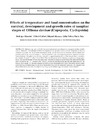Identificador persistente para citar o vincular este elemento:
https://accedacris.ulpgc.es/jspui/handle/10553/75523
| Título: | Effects of temperature and food concentration on the survival, development and growth rates of naupliar stages of Oithona davisae (Copepoda, Cyclopoida) | Autores/as: | Almeda García, Rodrigo Calbet, A Alcaraz, M Yebra, L Saiz, E |
Clasificación UNESCO: | 251001 Oceanografía biológica | Palabras clave: | Nauplii Oithona davisae Growth Development Survival, et al. |
Fecha de publicación: | 2010 | Proyectos: | MICROROL - Role of microzooplankton in marine food webs dynamics: functional diversity, relevance in C, N and P cycles and trophic impact on primary producers (CTM2004-02575/MAR) OITHONA - Autoecology and ecophysiology of the marine cyclopoid copepod genus Oithona (CTM2007-60052 Physiological changes during the ontogeny of marine copepods: metabolic balance and contribution to C, N and P cycles (200630I226) PERFIL (CTM2006-12344) |
Publicación seriada: | Marine Ecology - Progress Series | Resumen: | Oithona spp. are probably the most abundant and ubiquitous copepods in the world’s oceans. However, knowledge of their development and growth rates is scarce compared to that of calanoid copepods. In the present laboratory study, we determined the survival, development and growth rates of the naupliar stages of Oithona davisae under different temperature regimes and food concentrations. Naupliar survival was reduced to approximately 60% at the lowest food concentration tested (11 µg C l–1 after 7 d at 20°C). The development of O. davisae nauplii was equiproportional, but not isochronal. Food concentrations required for maximum development and growth rates were 56 and 87 µg C l–1, respectively. The Q10 values for development and growth depended on the temperature range. O. davisae nauplii showed similar developmental times, but lower growth rates and food requirements than values reported in the literature for calanoid copepods. We suggest that these differences may help to explain the ubiquity of Oithona spp. in oceanic environments. | URI: | https://accedacris.ulpgc.es/handle/10553/75523 | ISSN: | 0171-8630 | DOI: | 10.3354/meps08625 | Fuente: | Marine Ecology - Progress Series [ISSN 0171-8630], v. 10, p. 97-109 |
| Colección: | Artículos |
Citas de WEB OF SCIENCETM
Citations
30
actualizado el 22-feb-2026
Visitas
49
actualizado el 10-ene-2026
Descargas
45
actualizado el 10-ene-2026
Google ScholarTM
Verifica
Altmetric
Comparte
Exporta metadatos
Los elementos en ULPGC accedaCRIS están protegidos por derechos de autor con todos los derechos reservados, a menos que se indique lo contrario.
